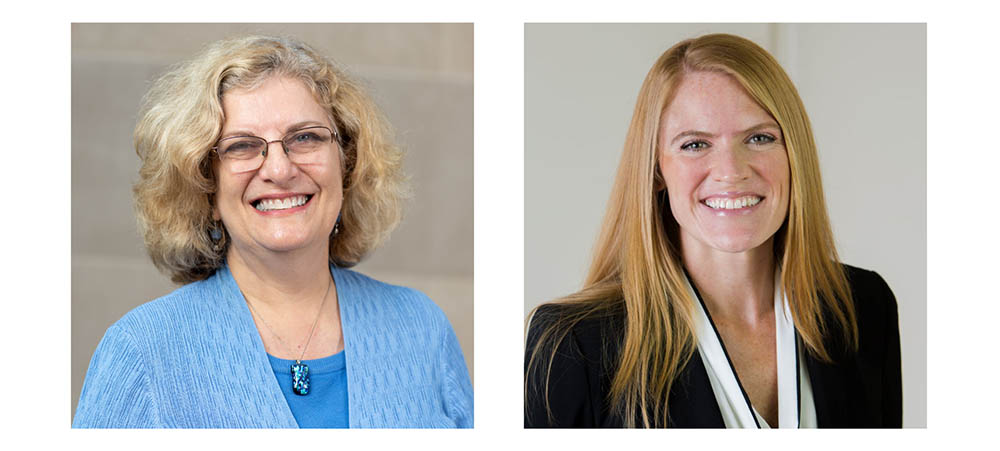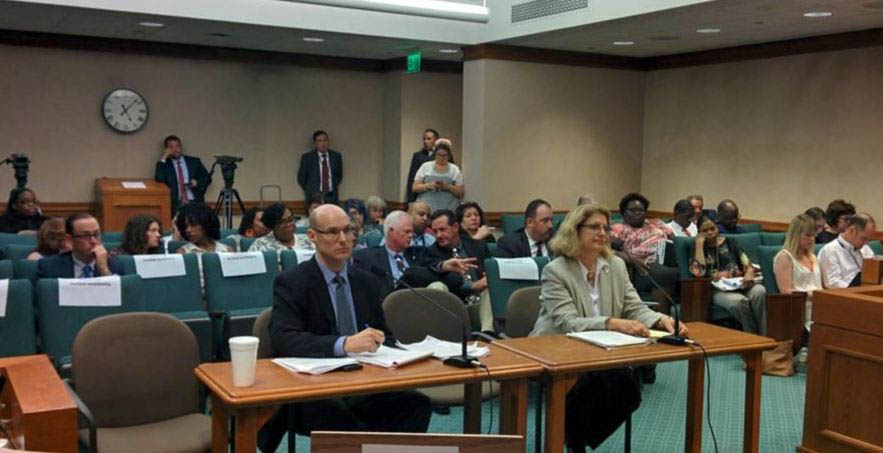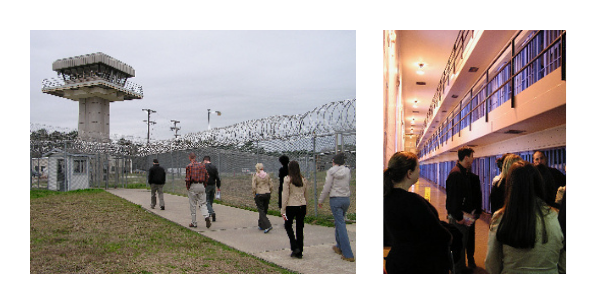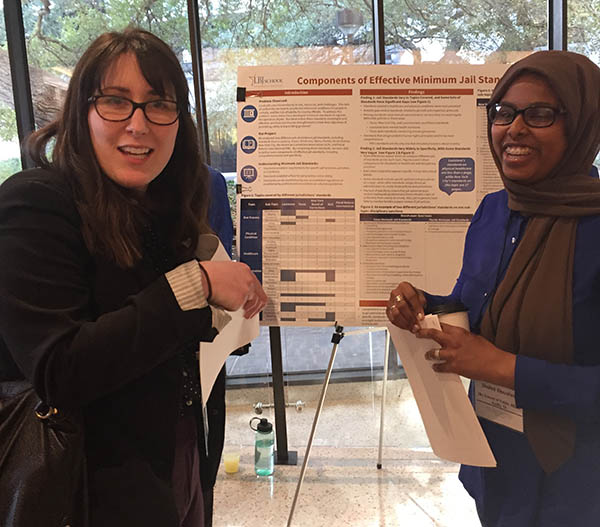AUSTIN, Texas — The Lyndon B. Johnson School of Public Affairs at The University of Texas at Austin has established a new national policy resource center working to ensure the safe and humane treatment of people in custody and cultivate the next generation of justice policy leaders. The Prison and Jail Innovation Lab (PJIL) serves as a bridge between academic research, practical experience and policy on pressing matters related to independent correctional oversight and conditions of confinement.
PJIL's launch also marks the creation of its signature project, the National Resource Center on Correctional Oversight, which provides guidance and research to policymakers, elected and appointed officials, and advocates across the country interested in developing or strengthening correctional oversight mechanisms in their state or local jurisdiction. The Resource Center will build on the extensive contributions PJIL's directors have already made to the oversight field, and will continue to produce research about effective correctional oversight measures. In the coming months, the clearinghouse will also develop a digital repository to track oversight developments and to store resource materials about every correctional oversight entity across the country.
- Prison and Jail Innovation Lab
- Prof. Deitch Leads New Criminal Justice Policy Lab (UT School of Law, Dec. 8, 2021)
PJIL was founded and is led by Michele Deitch, a distinguished senior lecturer at the LBJ School with a joint appointment at the UT School of Law, and by Alycia Welch, PJIL's associate director and a proud LBJ School alum (MPAff, MSSW '15). These national thought leaders bring to this venture a combined 55 years of experience impacting policy, practice and public perception to improve how people in custody are treated.

"There is an urgent need for initiatives that draw on the best available research to reduce harm inside prisons and jails, help transform facilities into safe and healthy places that respect human dignity, and to reduce the need for incarceration," Deitch said. "PJIL will fill that gap. Our work promotes a shift in thinking about the needs of people in custody, and helps correctional agencies operate in a more transparent and accountable manner."
"Our work promotes a shift in thinking about the needs of people in custody, and helps correctional agencies operate in a more transparent and accountable manner." —Michele Deitch
Using a collaborative research-to-practice model, PJIL works on projects around the country to provide research, analysis and guidance on corrections issues for policymakers, correctional leaders, advocates, individuals with lived experience, and the media.

"PJIL analyzes current challenges that impede the safe and humane treatment of people in custody, develops innovative policy solutions grounded in research, disseminates these solutions to the field, and provides technical assistance to key stakeholders such as legislators and corrections officials," Welch said.
PJIL will focus on four priority areas:
- Transparency & Oversight: Supporting policymakers, practitioners and advocates across the country who want to create or enhance transparency and oversight mechanisms.
- Health & Safety: Assessing problems related to the health and safety of people in custody, and bringing attention to the need for improved conditions of confinement informed by public health considerations.
- Women in Custody: Providing practitioners and policymakers with guidance on ways to improve the treatment of women in custody.
- Youth Justice: Advocating for keeping youth out of the adult criminal justice system and for treating youth in custody in a developmentally appropriate manner.

(Photo courtesy of Michele Deitch)
Deitch and Welch are well-known leaders who have had a significant impact on criminal justice policy in Texas and beyond. Deitch is the country's leading expert on independent prison oversight, a trusted resource for legislators and corrections officials, a former federal court-appointed monitor of conditions in the Texas prison system, and a prize-winning teacher at the LBJ School. Welch is known for her innovative work at the intersection of gender, behavioral health and criminal justice, with experience developing community-based organizations and programs, designing and conducting impact evaluations, and supporting state and local leaders in their effort to improve the criminal justice system.
PJIL's graduate students work closely with the directors for training, practical experience and mentorship to become effective policy professionals and advocates for justice reform.
"The Prison and Jail Innovation Lab exemplifies President Johnson's vision of the LBJ School as a place for people who dream of progress and of trying to turn those dreams into solid achievements. ... The creation of this lab is an important testament to its directors' service-minded leadership" —Dean JR DeShazo
"By focusing on society's most opaque public institutions as a site for change, the Prison and Jail Innovation Lab exemplifies President Johnson's vision of the LBJ School as a place for people who dream of progress and of trying to turn those dreams into solid achievements," said JR DeShazo, dean of the LBJ School of Public Affairs. "This lab gives students a chance to have an impact early in their careers, while providing them the opportunity to network with the nation's top leaders on a subject that is dominating today's public discourse. The creation of this lab is an important testament to its directors' service-minded leadership."

(Photo courtesy of Michele Deitch)
PJIL will also draw on the talents and guidance of its Advisory Committee, chaired by Professor Andrea Armstrong of Loyola University New Orleans College of Law and an expert on jail deaths in custody and the need for improved transparency in corrections.
"I'm honored to support PJIL in this capacity," said Armstrong. "PJIL will be a go-to resource for public officials on ways to improve what happens behind bars. Conditions in prisons, jails and detention centers are enormously important, but they are an overlooked area of criminal justice reform."
Other inaugural Advisory Committee members, drawn from across the country, represent diverse backgrounds, skills and expertise, including people whose lives have been directly affected by the criminal justice system, researchers, practitioners, elected officials, advocates and nationally known innovators.
PJIL was established in part with generous support from the LBJ School and its lead partner, Arnold Ventures. To learn more about the impact PJIL's directors have had on the field, PJIL's initial projects, and ways to donate, visit pjil.org or email PJIL@austin.utexas.edu.
Prof. Michele Deitch was recently on @TexasStandard to discuss rethinking incarceration in the US & launching the Prison and Jail Innovation Lab (#PJIL).
— The LBJ School (@TheLBJSchool) Dec. 14, 2021
Listen now: https://t.co/awPx9sZBoW pic.twitter.com/lKWLwcMRoY
We're proud to lead our nation's #CriminalJusticeReform with the launch of the Prison & Jail Innovation Lab.#PJIL will focus on correctional oversight & train the next gen. of justice policy leaders!
— The LBJ School (@TheLBJSchool) Dec. 8, 2021
Learn more about #PJIL's impact: https://t.co/kj2tW7NdA7 pic.twitter.com/asB4eCyFHq
#PJIL's launch also marks the creation of its signature project:
— The LBJ School (@TheLBJSchool) Dec. 8, 2021
The National Resource Center on Correctional Oversight, which will track oversight & store resource materials on every US correctional oversight entity.
Stay up to date on #PJIL: https://t.co/4ZTWCKid2a pic.twitter.com/RCIZNIDOMz
Announcing the Prison and Jail Innovation Lab! Led by @mydeitch and @WelchAlycia https://t.co/m7pWB3tKGv
— Prison and Jail Innovation Lab (@PJInnovationLab) Dec. 8, 2021
Some personal news (I have always wanted to say that!): I am thrilled to announce the launch of the Prison and Jail Innovation Lab @TheLBJSchool! Please follow us @PJInnovationLab, and check out our website at https://t.co/4NGPAHT3yc. #PJIL #prisonoversight https://t.co/h1Qe5v3sO7
— Michele Deitch (@mydeitch) Dec. 8, 2021
News alert: @mydeitch and I are thrilled to announce the launch of the Prison and Jail Innovation Lab @TheLBJSchool! Follow us @PJInnovationLab & visit https://t.co/I2JOw215cM to sign up for our mailing list. #PJIL #prisonoversight https://t.co/zfqxxkwvzY
— Alycia Welch (@WelchAlycia) Dec. 9, 2021
@PJInnovationLab is led by our faculty who have a combined 55 yrs experience on #CriminalJustice.
— The LBJ School (@TheLBJSchool) Dec. 9, 2021
The team is made up of our graduate student assistants, who participate in collaborate research & help advance #PJIL's project portfolio.
More about team: https://t.co/Lykwuo0OB6 pic.twitter.com/4cFSjmckis
The Prison and Jail Innovation Lab (PJIL) serves as a bridge between academic research, practical experience and policy on pressing matters related to independent correctional oversight and conditions of confinement. #UTinServicetoTexas https://t.co/lH1W9NHNcc
— UT System (@utsystem) Dec. 9, 2021

